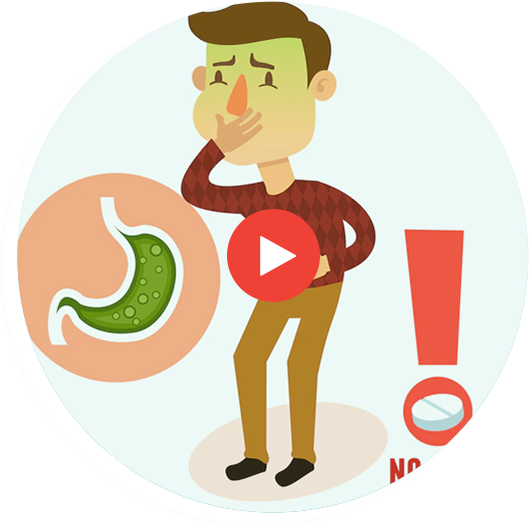
TELMDCARE
What is This Sick
Feeling Called Nausea?
Nausea and vomiting often occur simultaneously, or one after the other but are not illnesses or diseases in themselves. They occur as symptoms of another apparent or underlying condition and can cause significant discomfort.
Vomiting is basically a reflex, often an uncontrollable one which leads you to forcefully turn out the contents of the stomach through your mouth. It’s commonly referred to as “throwing up” or being “sick.”
Nausea,on the other hand, is a feeling one may experience before vomiting. It’s an uneasy feeling in the stomach with an uncontrollable urge to vomit, and usually, it does lead to actual vomiting.
In general, nausea and vomiting are very common, with every person experiencing them at some point in life—some more than others. They can be caused by negligible factors or serious underlying conditions and diseases.
Book an Appointment for Only
TELMDCARE
Is covered by many popular
insurance plans

Symptoms Of
Nausea
The symptoms of chronic nausea are hard to describe. People have different experiences:
People feel weak and have a lot of saliva in their mouths when nauseated. In most cases, you don’t have to worry about vomiting and nausea but it can be a symptom of other conditions and ailments.
Food poisoning and stomach flu are two causes of nausea/vomiting. If you have nausea from the viral flu, it will last 24 hours. For food poisoning, the duration is 12 to 48 hours.
If you feel any of the aforementioned symptoms, you can consult our virtual doctors for nausea and vomiting online!
What Causes Nausea
& Vomiting
It can usually be very hard to determine exactly what has caused you to feel nauseous and vomit. An expert physician may ask you several questions before they are able to figure out the exact cause in order to treat it.
Abdominal
Conditions
Quite a few abdominal and pelvic conditions cause nausea. Depending on the exact cause, these conditions may affect the gastrointestinal tract, the liver, and the reproductive system.
TELMDCARE
How to Prevent Nausea
You can prevent nausea in several ways listed below:
- Eat slowly and in small portions throughout the day. Avoid taking three large meals.
- Don’t eat hard-to-digest or indigestible foods.
- Take water between meals or other liquids.
- Consume food at room temperature.
- Eat food when you’re less nauseated.
- Rest after eating your meal. Rest your head at 12 inches over the feet.
How to Prevent Vomiting After Feeling Nauseated
- If you start feeling nauseous, you can prevent vomiting in the following ways:
- Rest propped up or resting in a sitting position. Being active may worsen the situation which can cause vomiting.
- Drinking small sweetened and clear liquids such as fresh fruit juices or soda. Avoid grapefruits and orange juices because they are acidic.
You can prevent nausea and vomiting in your kids by helping them stay still while eating. Don’t let them play while they’re eating. If your kid has motion sickness, make them sit facing the windshield instead of the side window as it can worsen nausea. Playing or reading can also cause motion sickness and nausea.
TELMDCARE
Treatment Options for
Nausea & Vomiting
Typically, since nausea and vomiting are symptoms of other underlying conditions, the treatment options depend on what’s causing them. Treating the condition then could help one get rid of nausea and vomiting as well.
There are also medications that can be taken to prevent or ease nausea and vomiting. And in case the vomiting is out of control and causing dehydration, fluids can be taken via an IV to rehydrate the body.
Here are some other things one can try to feel better when feeling very nauseous:
TELMDCARE
As Seen On

When Should You See TelMDCare’s Acute Care
Doctors for Nausea & Vomiting?
In general, you should check in with a doctor if the symptoms last for longer than 24 hours despite the prevention efforts. Also, if nausea or vomiting seems to be getting worse. But in some cases, especially where children are concerned, emergency care is a better option. For babies and toddlers under 6, seek emergency care if:
For children above 6, one must consult medical experts if:
Adults should seek immediate medical help if there’s blood in the vomit, a stiff neck, severe abdominal pain, rapid pulse, and other alarming symptoms.


TELMEDCARE
What we treat
We treat a variety of acute and chronic conditions and provide expert medical advice and guidance for our patients.
Read More

TelMDCare’s Telemedicine Doctor Can Help You
with Nausea & Vomiting
If the vomiting and nausea are not severe enough for you to rush to the ER, you can book an appointment with our expert doctors and physicians. Say goodbye to long waiting lines, sitting through rush hours and taking the day off from work!
With an online appointment, our doctor will be able to determine what’s causing your condition and advise a treatment plan accordingly.
So, sign up and book an appointment right away!
TELMDCARE
Sign Up
Our best online doctors on call ensure that the services we provide are adequate, high quality,
and affordable.
Get in touch with us today for more details or Sign Up for a quick consultation.
$43 SIGN UP
TELMDCARE
FAQs Related to Nausea & Vomiting
Generally, it can be hard to pinpoint the exact cause on your own. It’s best to consult a doctor if the symptoms persist. The doctor will ask several questions regarding your general health, lifestyle, severity, and frequency of nausea or vomiting, food history, and whether you’ve had contact with a sick person. This may help them determine the exact cause. Or they may also order some blood and urine tests or an abdominal X-ray to be absolutely sure.
Most of the time when the underlying issue is addressed, vomiting does not present any long-term problems. However, in some cases of severe and persistent vomiting, complications may arise due to dehydration and malnutrition.
This is a common misconception and teething in fact has no direct link with vomiting. Causes of vomiting in children that young could be reflux, a minor intestinal, chest or urine infection, food intolerance or allergy, food poisoning, or perhaps some other more serious underlying condition.



